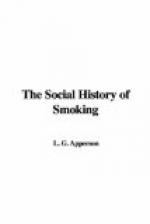The Duke’s prejudices were stronger than his facts. The statement, not very grammatically expressed, that “the practice of smoking” was “itself a species of intoxication” was absurd enough; but the allegation, introduced by a question-begging “undoubtedly,” that smoking occasioned drinking was directly contrary to fact. It was the introduction of after-dinner smoking that largely helped to kill the bad old practice of continued after-dinner drinking.
Perhaps the best reflection of and comment upon the attitude of society towards smoking is to be found in the ironical, satirical pages of Thackeray. Let the reader turn to the confessions of George Fitz-Boodle Esq.—the “Fitz-Boodle Papers” first appeared in Fraser’s Magazine for 1842—and he will find how smoking was regarded at that date, and what Thackeray, speaking through the puppet Fitz-Boodle, thought of it. George starts by saying: “I am not, in the first place, what is called a ladies’ man, having contracted an irrepressible habit of smoking after dinner, which has obliged me to give up a great deal of the dear creatures’ society; nor can I go much to country-houses for the same reason.” The ladies had a keen scent for the abominable odour of tobacco, and distrusted the men who smoked. Here is Fitz-Boodle’s, or Thackeray’s, comment on it—“What is this smoking that it should be considered a crime? I believe in my heart that women are jealous of it, as of a rival. They speak of it as of some secret awful vice that seizes upon a man, and makes him a pariah from genteel society. I would lay a guinea that many a lady who has just been kind enough to read the above lines lays down the book, after this confession of mine that I am a smoker, and says, ’Oh, the vulgar wretch!’ and passes on to something else.” He goes on to prophesy—and for once the “most gratuitous of follies” has been justified by the event—that tobacco will conquer. “Look over the wide world,” he says to the ladies, “and see that your adversary has overcome it. Germany has been puffing for three score years; France smokes to a man. Do you think you can keep the enemy out of England? Psha! look at his progress. Ask the club-houses, Have they smoking-rooms, or not? Are they not obliged to yield to the general want of the age, in spite of the resistance of the old women on the committees? I, for my part, do not despair to see a bishop lolling out of the ‘Athenaeum’ with a cheroot in his mouth, or, at any rate, a pipe stuck in his shovel-hat.”
The flight of fancy in the last sentence has hardly yet been fulfilled; but I saw, many years ago, a distinguished man of letters, the late Mr. Francis Turner Palgrave, of “Golden Treasury” fame, who was an inveterate smoker, sitting on one of the cane benches by the door of the Athenaeum Club, smoking a short clay pipe.
Thackeray does not appear to have realized that tobacco was not invading England for the first, but for the second time, nor did he foresee that the ladies, to whom he addressed his impassioned defence of smoking, would not only submit to the conqueror but would themselves be found among his joyous devotees.




